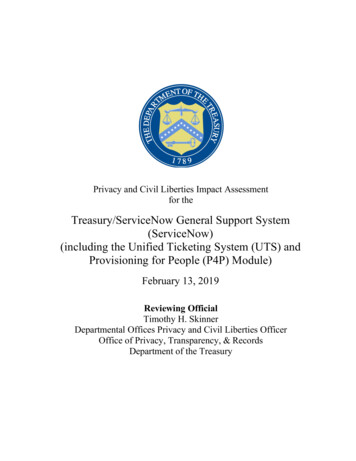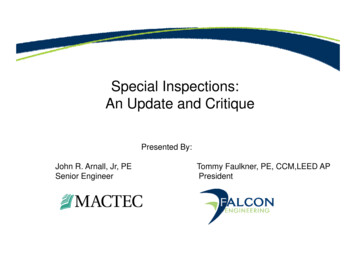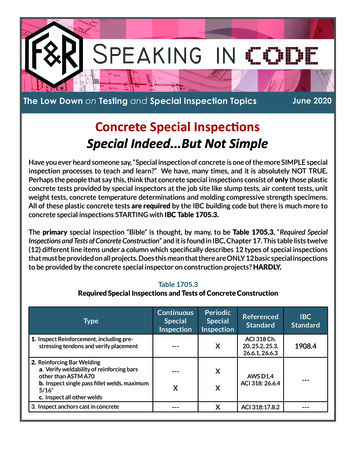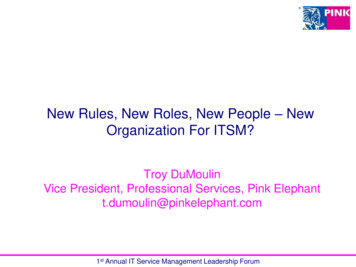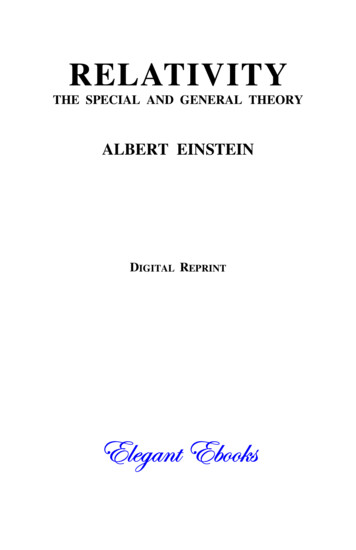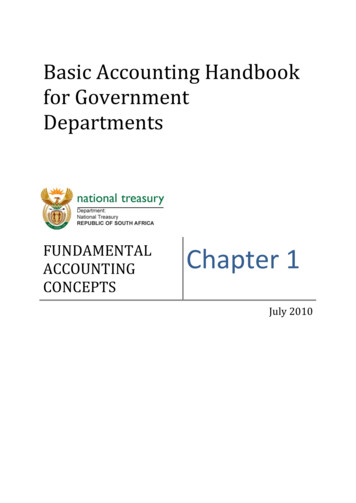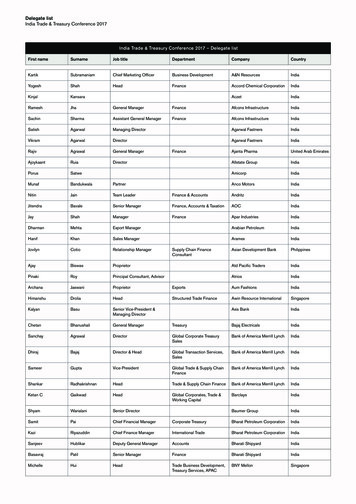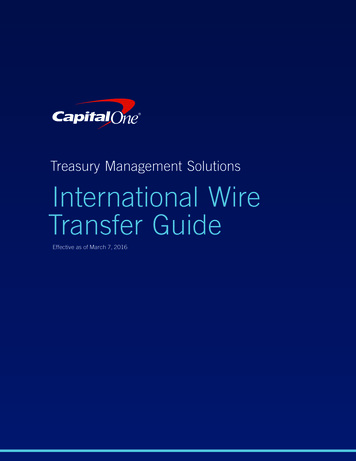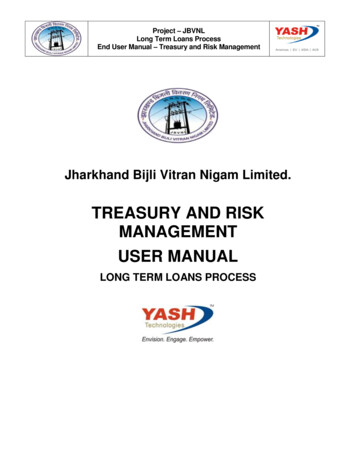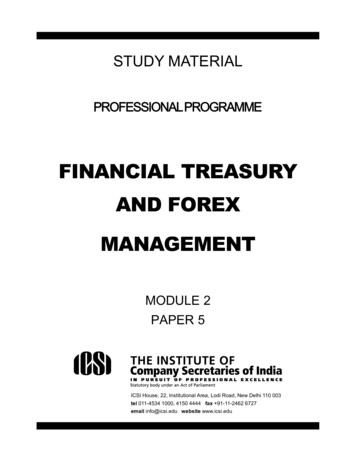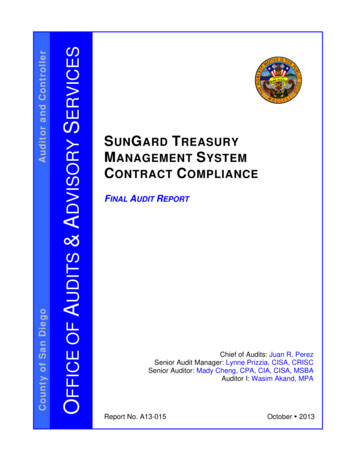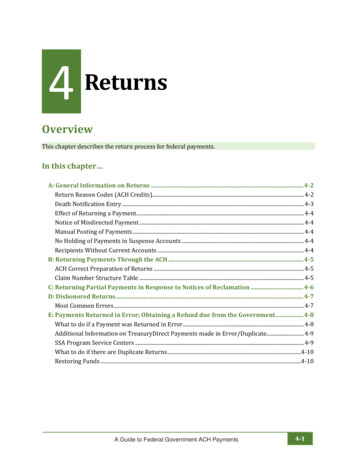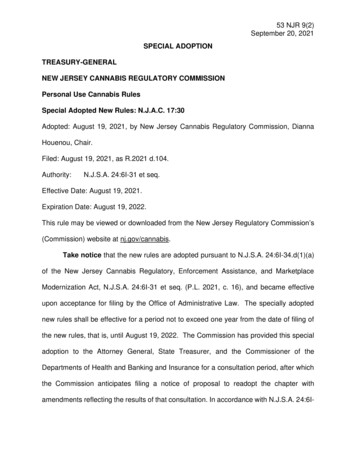
Transcription
53 NJR 9(2)September 20, 2021SPECIAL ADOPTIONTREASURY-GENERALNEW JERSEY CANNABIS REGULATORY COMMISSIONPersonal Use Cannabis RulesSpecial Adopted New Rules: N.J.A.C. 17:30Adopted: August 19, 2021, by New Jersey Cannabis Regulatory Commission, DiannaHouenou, Chair.Filed: August 19, 2021, as R.2021 d.104.Authority:N.J.S.A. 24:6I-31 et seq.Effective Date: August 19, 2021.Expiration Date: August 19, 2022.This rule may be viewed or downloaded from the New Jersey Regulatory Commission’s(Commission) website at nj.gov/cannabis.Take notice that the new rules are adopted pursuant to N.J.S.A. 24:6I-34.d(1)(a)of the New Jersey Cannabis Regulatory, Enforcement Assistance, and MarketplaceModernization Act, N.J.S.A. 24:6I-31 et seq. (P.L. 2021, c. 16), and became effectiveupon acceptance for filing by the Office of Administrative Law. The specially adoptednew rules shall be effective for a period not to exceed one year from the date of filing ofthe new rules, that is, until August 19, 2022. The Commission has provided this specialadoption to the Attorney General, State Treasurer, and the Commissioner of theDepartments of Health and Banking and Insurance for a consultation period, after whichthe Commission anticipates filing a notice of proposal to readopt the chapter withamendments reflecting the results of that consultation. In accordance with N.J.S.A. 24:6I-
34.d(1)(b) the rules, as readopted, will become effective upon acceptance for filing by theOffice of Administrative Law if filed on or before the expiration date of the rules. Theadopted amendments will be effective upon publication in the New Jersey Register.Federal Standards AnalysisThe New Jersey Cannabis Regulatory, Enforcement Assistance, andMarketplace Modernization Act (Act) obliges the New Jersey Cannabis RegulatoryCommission to promulgate rules necessary or proper to enable it to carry out theCommission’s duties, functions, and powers with respect to overseeing thedevelopment, regulation, and enforcement of activities associated with the person aluse of cannabis pursuant to P.L. 2021, c.16. These duties include the regulation ofthe purchase, sale, cultivation, production, manufacturing, transportation, anddelivery of cannabis or cannabis items in accordance with the provisions of the Act.Therefore, the Act requires the Commission to promulgate rules governing the regulatedcommunity’s cultivation, possession, manufacture, sale, distribution, and use ofcannabis.The Controlled Substances Act, 21 U.S.C. §§ 801 et seq., prohibits thecultivation, distribution, and possession of marijuana, for any reason, regardless of statelaw. 21 U.S.C. §§ 841 et seq. The new rules anticipate that members of the regulatedcommunity would cultivate, distribute, and possess marijuana, and may engage incertain financial activities that are ancillary to cultivation, distribution, and possession ofmarijuana. These ancillary financial activities may constitute prohibited conduct underother Federal criminal and civil laws, such as the money laundering statutes, the2
unlicensed money transmitter statute, and the Bank Secrecy Act (BSA). 18 U.S.C. §§1956 through 1957, and 1960; and 31 U.S.C. § 5318.Therefore, the new rules will conflict with Federal law. Members of the regulatedcommunity who engage in activities contemplated by the Act might incur Federal civiland criminal liability. N.J.S.A. 24:6I-2.d notes that “States are not required to enforce[Federal] law or prosecute people for engaging in activities prohibited by [Federal] law;therefore, compliance with [the Act] does not put the State of New Jersey in violation of[Federal] law,” and N.J.S.A. 24:6I-54 further directs law enforcement in New Jersey tonot cooperate with Federal agencies enforcing The Controlled Substances Act foractivities solely authorized by the Act.Between October 2009 and late October 2014, the United States Department ofJustice (Justice Department) issued a series of formal memoranda to United StatesAttorneys to guide their exercise of investigative and prosecutorial discretion in statesenacting laws authorizing the cultivation, distribution, and possession of marijuana, formedicinal and/or recreational purposes. David W. Ogden, Deputy Attorney Gen.,Memorandum for Selected United States Attorneys: Investigations and Prosecutions inStates Authorizing the Medical Use of Marijuana (October 19, 2009); James M. Cole,Deputy Attorney Gen., Memorandum for United States Attorneys: Guidance Regardingthe Ogden Memo in Jurisdictions Seeking to Authorize Marijuana for Medical Use (June29, 2011); James M. Cole, Deputy Attorney Gen., Memorandum for All United StatesAttorneys: Guidance Regarding Marijuana Enforcement (August 29, 2013); James M.Cole, Deputy Attorney Gen., Memorandum for All United States Attorneys: GuidanceRegarding 32 Marijuana Related Financial Crimes (February 14, 2014); and Monty3
Wilkinson, Director of the Executive Office for United States Attorney’s, PolicyStatement Regarding Marijuana Issues in Indian Country (Oct. 28, 2014). While notingthe Justice Department’s commitment to enforcing the Controlled Substances Act, theseguidance memoranda instructed United States Attorneys to focus on the following eightenforcement interests in prioritizing the prosecution of Federal laws criminalizingmarijuana-related activity in states that have enacted laws authorizing marijuana-relatedconduct:1. Preventing the distribution of marijuana to minors;2. Preventing revenue from the sale of marijuana from going to criminal enterprises,gangs, and cartels;3. Preventing the diversion of marijuana from states where it is legal in some formunder state law to other states;4. Preventing state-authorized marijuana activity from being used as a cover orpretext for the trafficking of other illegal drugs or other illegal activity;5. Preventing violence and the use of firearms in the cultivation and distribution ofmarijuana;6. Preventing drugged driving and the exacerbation of other adverse public healthconsequences associated with marijuana use;7. Preventing the growing of marijuana on public lands and the attendant publicsafety and environmental dangers posed by marijuana production on publiclands; and8. Preventing marijuana possession or use on federal property. Cole (August 29,2013), Id., at 1-2.4
The memoranda encouraged United States Attorneys to continue to rely on states thathave enacted laws authorizing marijuana-related conduct to address marijuana-relatedactivity through enforcement of state narcotics laws, if those states “provide thenecessary resources and demonstrate the willingness to enforce their laws andregulations in a manner that ensures they do not undermine” the eight Federalenforcement priorities, Id., at 2-3, and “implement clear, strong and effective regulatoryand enforcement systems in order to minimize the threat posed” to the eight Federalenforcement priorities. Cole (February 14, 2014), Id., at 3. The memoranda noted thatpersons and entities engaged in marijuana-related activities “are more likely to riskentanglement with conduct that implicates the eight [Federal] enforcement priorities” instates that lack “clear and robust” regulatory schemes and enforcement systems. Ibid.In guidance issued concurrently with Deputy United States Attorney General Cole’sFebruary 14, 2014, memorandum on marijuana-related financial crime enforcementpriorities, Ibid., the Financial Crimes Enforcement Network (FinCEN) of the UnitedStates Department of the Treasury (Treasury Department) issued a companionguidance document that “clarifies how financial institutions can provide services tomarijuana-related businesses consistent with their Bank Secrecy Act (BSA) obligations,and aligns the information provided by financial institutions in BSA reports with [Federal]and state law enforcement priorities. This FinCEN guidance should enhance theavailability of financial services for, and the financial transparency of, marijuana-relatedbusinesses.” FinCEN, United States Department of the Treasury, Guidance FIN-2014G001: BSA 34 Expectations Regarding Marijuana-Related Businesses (February 14,2014) (FinCEN Guidance).5
The FinCEN guidance emphasizes that financial institutions’ exercise of thoroughdue diligence is critical to their assessment of the risk of providing services tomarijuana-related businesses, and specifies tasks financial institutions should performas part of their due diligence, noting that as “part of its customer due diligence, afinancial institution should consider whether a marijuana-related business implicatesone of the [eight Federal enforcement] priorities or violates state law.” Id., at 2-3. TheFinCEN Guidance identifies the types of required “Suspicious Activity Report” and“Currency Transaction Report” filings that financial institutions are to make attendant totheir engagement with marijuana-related businesses, and provides a non-exhaustive listof “red flags” or indicia that could give rise to a financial institution’s suspicion, or actualor constructive knowledge, “that a marijuana-related business may be engaged inactivity that implicates one of the [eight Federal enforcement] priorities or violates statelaw,” thereby triggering the financial institution’s obligations to perform additional duediligence investigation and/or file a “Marijuana Priority” Suspicious Activity Report. Id., at3-7.On January 4, 2018, the Justice Department issued a memorandum to all UnitedStates Attorneys, instructing them that, in “deciding which marijuana activities toprosecute under [applicable Federal] laws with the [Justice] Department’s finiteresources, to follow the well-established principles that govern all [Federal] prosecutionsas reflected in the United States Attorneys’ Manual. These principles require [Federal]prosecutors deciding which cases to prosecute to weigh all relevant considerations,including [Federal] law enforcement priorities set by the Attorney General, theseriousness of the crime, the deterrent effect of criminal prosecution, and the6
cumulative impact of particular crimes on the community. Given the Department’s wellestablished general principles, previous nationwide guidance specific to marijuanaenforcement is unnecessary and is rescinded, effective immediately.” Jefferson B.Sessions, III, Attorney Gen., Memorandum for All United States Attorneys: MarijuanaEnforcement (January 4, 2018) (Sessions Memorandum) (specifically listing, at n.1, the2009 through 2014 Justice Department Memoranda, discussed above, as rescinded).The Sessions Memorandum neither identified the “law enforcement priorities set by theAttorney General” that United States Attorneys were to consider instead of the eightFederal enforcement priorities announced in the rescinded Justice DepartmentMemoranda, nor did it explain whether and how those sets of priorities might differ.However, the press release accompanying its issuance characterized the SessionsMemorandum as, “announcing a return to the rule of law,” and quoted Attorney GeneralSessions as saying that the Sessions Memorandum, “simply directs all [United States]Attorneys to use previously established prosecutorial principles that provide them all thenecessary tools to disrupt criminal organizations, tackle the growing drug crisis, andthwart violent crime across our country.” Office of Public Affairs, Justice Department,Press Release No. 18-8: Justice Department Issues Memo on Marijuana Enforcement(January 4, 2018).The Treasury Department did not issue guidance, concurrent with the issuanceof the Sessions Memoranda, or thereafter, rescinding its FinCEN Guidance. Therefore,the FinCEN Guidance appears to remain extant. Despite the Sessions Memorandaguidance, existing Federal statutes protect and safeguard state-administered legalmedicinal marijuana programs.7
The Rohrabacher-Blumenauer amendment (previously known as theRohrabacher-Farr amendment), most recently sponsored by United StatesRepresentatives Dana Rohrabacher (R-CA) and Earl Blumenauer (D-OR), prevents theJustice Department from using Federal funds to prosecute state-compliant medicalmarijuana operators in states that have legal cannabis programs. It was first approvedin 2014, approved or renewed by Congress more than 11 times since, and mostrecently renewed on December 27, 2020, as part of the most recent omnibus spendingbill, the Consolidated Appropriations Act (Pub. L. 116-260), which is in effect throughSeptember 30, 2021.Attorney General Merrick Garland, appointed by President Biden, has notofficially readopted the Cole memo; however, he did indicate in his confirmationhearings that utilizing Federal resources to combat marijuana use in states with legalframeworks was not a priority.The new chapter addresses the potential Federal-State conflict as it pertains tocannabis by adhering to the standards outlined in the Cole memo. The chapter requiresstrict inventory tracking, sets stringent security standards for cannabis businesses, andfurther enforces the Act’s prohibition on the sale of cannabis to anyone under the age of21. Furthermore, the new chapter, references similar standards to those outlined in theCole Memo in the Cannabis Regulatory Commission’s rules for determining who isqualified to hold a license and engage in activity authorized by the Act.Full text of the specially adopted new rules follows:CHAPTER 308
PERSONAL USE CANNABIS RULESSUBCHAPTER 1. GENERAL PROVISIONS17:30-1.1Purpose and scope(a) This chapter implements the Cannabis Regulatory, Enforcement Assistance, andMarketplace Modernization Act, P.L. 2021, c. 16 (N.J.S.A. 24:6I-31 et seq).(b) This chapter is applicable to the development, expansion, regulation, andenforcement of all activities associated with the personal use of cannabis pursuant to theAct.(c) This chapter applies to any person, entity, organization, or business possessing,buying, selling, cultivating, producing, manufacturing, transporting, or delivering anycannabis or cannabis items within this State, or engages in any other activity associatedwith the personal use of cannabis pursuant to the Act.17:30-1.2Definitions(a) All definitions contained in the Cannabis Regulatory, Enforcement Assistance, andMarketplace Modernization Act, P.L. 2021, c. 16 (N.J.S.A. 24:6I-31 et seq.) areincorporated herein by reference.(b) The following words and terms, as used in this chapter, shall have the followingmeanings, unless the context clearly indicates otherwise:“Accreditation body” means an impartial, non-profit organization that:1. Is a signatory to the International Laboratory Accreditation Cooperation (ILAC)Mutual Recognition Arrangement for Testing and is recognized by ILAC;9
2. Determines a laboratory’s compliance with and conformance to the InternationalOrganization for Standardization (ISO) 17025 standards and provides accreditation forcompliant laboratories; and3.Is not affiliated with any laboratory seeking accreditation."Act" means the Cannabis Regulatory, Enforcement Assistance, and MarketplaceModernization Act, P.L. 2021, c. 16 (N.J.S.A. 24:6I-31 et seq.).“Adverse event” means any health-related event in a person, which is associatedwith the use of a cannabis item, that is undesirable and is unexpected or unusual.“Advertisement” means any calculated attempt to directly or indirectly induce salesof cannabis items, including, but not limited to, any commercial written or verbal statementor communication of any other means. The term shall not include:1. Noncommercial speech;2. A label on a cannabis item pursuant to N.J.A.C. 17:30-13.3 and its accompanyingsupplemental information, pursuant to N.J.A.C. 17:30-12.3(i) and (j);3. Information provided by a cannabis business to another cannabis business listingits products for sale; and4. “Adopt-a-Highway” signs erected under a current valid sponsorship with the NewJersey Department of Transportation.“Aggregate ownership interest” means the total ownership interest held by anowner that is a person and by the spouse, domestic partner, civil union partner, child,sibling, or parent of the person."Alternative treatment center" or "ATC" means a medical cannabis cultivator, amedical cannabis manufacturer, and/or a medical cannabis dispensary that has been10
issued a permit to cultivate, manufacture, dispense, or engage in other activities relatedto medical cannabis and related paraphernalia pursuant to P.L. 2019, c. 153 and N.J.A.C.17:30A.“Batch” means a specific quantity of usable cannabis propagated from the sameseed or plant stock at the same time, cultivated in the same cultivation area under similarconditions, and harvested together during a specific time interval.“Billboard” means a large outdoor off-premises sign, with a minimum size of fivefeet in height by 11 feet in width, used for the display of a commercial message.“Board member” means, where a cannabis business or testing laboratory licenseapplicant or license holder is governed by a governing body, such as a board of directors,a member of that governing body.“Bona fide labor organization” has the same meaning as at N.J.S.A. 24:6I-36.c."Business day" means any day, other than a Saturday, Sunday, or a Staterecognized holiday."Cannabidiol" or “CBD” means a non-psychoactive constituent of cannabis,C21H30O2.“Cannabis” means all parts of the plant Cannabis sativa L. within the plant familyCannabaceae, whether growing or not, the seeds thereof, and every compound,manufacture, salt, derivative, mixture, or preparation of the plant or its seeds, exceptthose containing resin extracted from the plant; which are cultivated and, whereapplicable, manufactured for use in cannabis products, in accordance with the Act andthis chapter.11
“Cannabis business” means a cannabis cultivator, a cannabis manufacturer, acannabis retailer, cannabis wholesaler, cannabis distributor, or cannabis delivery service.“Cannabis business” includes an “expanded ATC.”“Cannabis business delivery personnel” means cannabis business personnelpossessing a Cannabis Business Identification Card who deliver cannabis items on behalfof a cannabis business to a consumer at that person’s home address."Cannabis Business Identification Card" means a document issued by theCommission pursuant to N.J.A.C. 17:30-8.1(c) that identifies a person as an owner,principal, management services contractor, employee, volunteer, or vendor-contractoracting on behalf of a cannabis business or testing laboratory, including a cannabis handlerpursuant to N.J.S.A. 24:6I-44.a.“Cannabis concentrate” or “cannabis resin” means a product manufactured by acannabis manufacturer, either in solid form or in liquid form as oil, including cannabisextracts and resin extracted using non-chemical processes, that contains only the resin,cannabinoids, terpenes, and other substances extracted from any part of the cannabisplant.“Cannabis cultivator” means a business or organization owned and controlled bya license holder that holds a Class 1 Cannabis Cultivator license issued by theCommission.“Cannabis delivery service” means a business or organization owned andcontrolled by a license holder that holds a Class 6 Cannabis Delivery license issued bythe Commission.12
“Cannabis distributor” means a business or organization owned and controlled bya license holder that holds a Class 4 Cannabis Distributor license issued by theCommission.“Cannabis establishment” means a cannabis cultivator, a cannabis manufacturer,a cannabis wholesaler, or a cannabis retailer.“Cannabis extract” means a substance obtained by separating resins fromcannabis by:1. A chemical extraction process using a hydrocarbon-based solvent, such asbutane, hexane, or propane;2. A chemical extraction process using the hydrocarbon-based solvent carbondioxide, if the process uses high heat or pressure; or3. Any other process identified by the Cannabis Regulatory Commission by rule.“Cannabis flower” means the flower of the cannabis plant.“Cannabis item” means any usable cannabis or cannabis product that is cultivated,produced, manufactured, or consumed in accordance with the Act.“Cannabis leaf” means the leaf of the cannabis plant.“Cannabis manufacturer” means a business or organization owned and controlled bya license holder that holds a Class 2 Cannabis Manufacturer license issued by theCommission.“Cannabis paraphernalia" means any equipment, products, or materials of any kindthat are used, intended for use, or designed for use in planting, propagating, cultivating,growing, harvesting, composting, manufacturing, compounding, converting, producing,processing, preparing, testing, analyzing, packaging, repackaging, storing, vaporizing, or13
containing cannabis, or for ingesting, inhaling, or otherwise introducing a cannabis iteminto the human body.“Cannabis plant” means the plant Cannabis sativa L. within the plant familyCannabaceae in the seedling, vegetative, or flowering stages, with readily observableroots and leaves with serrated edges; but does not include a germinated seed, cutting, orclone without readily observable roots and leaves with serrated edges.“Cannabis product” means a cannabis concentrate or a cannabis-infused product,that a cannabis manufacturer manufactures, produces, or creates from usablecannabis or cannabis concentrate.“Cannabis retailer” means a business or organization owned and controlled by alicense holder who holds a Class 5 Cannabis Retailer license issued by the Commission.“Cannabis-infused product” means a product manufactured by a cannabismanufacturer in an authorized form that contains usable cannabis or cannabisconcentrate, in solid or liquid form, and one or more ingredients intended for humanconsumption or use, including an ingestible product, inhalable product, or dermal atoryCommissionestablished pursuant to section 31 of P.L. 2019, c. 153 (N.J.S.A. 24:6I-24) that:1. Is responsible for the administration and implementation of activities related to theAct; and2. Has a mailing address of PO Box 216, Trenton, NJ 08625-0216.“Common ownership or control” has the same meaning as at N.J.S.A. 24:6I-3.“Compassionate and Medical Use Acts” means the Jake Honig CompassionateUse Medical Cannabis Act, P.L. 2009, c. 307 (N.J.S.A. 24:6I-1 et seq.) and the14
Cannabis Regulatory, Enforcement Assistance, and Marketplace Modernization Act,P.L. 2021, c. 16 (N.J.S.A. 24:6I-31 et seq.).“Conditional license” means a temporary cannabis business license that is issuedpursuant to N.J.S.A. 24:6I-36.a(1).“Consumer” means a person 21 years of age or older who purchases, directly orthrough a cannabis delivery service, acquires, owns, holds, or uses cannabis items forpersonal use by a person 21 years of age or older. “Consumer” does not include a personwho acquires, owns, holds, uses, or has any other involvement in cannabis items forresale to others.“Consumption” means the act of ingesting, inhaling, or otherwise introducingcannabis items into the human body.“Cultivate” means the propagation, germination, planting, growing, harvesting,drying, curing, and processing of cannabis.“Curbside retail sale” means when a cannabis retailer sells a cannabis item to aconsumer inside a car that is on the exterior of the facility on the cannabis retailerpremises, which includes any parking lot and adjacent sidewalk that are located at thephysical address listed on the cannabis business license, pursuant to N.J.A.C. 17:3012.4.“Delivery vehicle” means the vehicle used for the transport of cannabis items orrelated supplies between cannabis businesses and for the delivery of cannabis items toconsumers.“Dermal products” means oil, topical formulation, and transdermal form intendedfor dermal application.15
“Diversely owned business” means a license applicant or license holder where theentity has been certified, pursuant to the criteria at N.J.A.C. 17:30-6.4, as:1. A minority-owned business pursuant to N.J.S.A. 52:27H-21.18 et seq.;2. A women-owned business pursuant to N.J.S.A. 52:27H-21.18 et seq.;3. A disabled-veterans-owned business, as defined at N.J.S.A. 52:32-31.2; or4. Any combination of paragraphs 1, 2, or 3 above.“Economically disadvantaged area” means a zip code that meets all of thefollowing socioeconomic criteria:1. Has a median income that is 80 percent or less of the average median householdincome in the State, as determined annually by the U.S. Census Bureau; and2. Has a health uninsured rate that is at least 150 percent of the health uninsuredrate in the State, as determined annually by the U.S. Census Bureau.“Electronic smoking device” means a pre-filled, tamper-resistant, non-refillable,disposable “all-in-one” e-cigarette or pre-filled, tamper-resistant, non-refillable cartridgeand separate battery used to heat and aerosolize or vaporize a cannabis product forinhalation.“Employee” means a person who is not an owner, principal, or vendor-contractorthat works for a cannabis business or testing laboratory and who receives remunerationor other tangible benefit from the cannabis business or testing laboratory for servicesperformed for the benefit of the cannabis business or testing laboratory regarding thepossession, cultivation, manufacture, transport, delivery, selling, or testing of, or otherconduct associated with, cannabis pursuant to the Act and this chapter.1. "Employee” includes managerial and non-managerial employees.16
"Entity” means an organization formed by one or more persons to conductbusiness, engage in a trade, or partake in similar activities.“Executive Director” means the Executive Director of the Cannabis RegulatoryCommission.“Expanded ATC” means a permitted ATC pursuant to P.L. 2019, c. 153 andN.J.A.C. 17:30A that is authorized to operate a cannabis business or businesses pursuantto the Act and this chapter, in addition to its ATC operations.“Financial consideration” means any thing of value that is given or received eitherdirectly or indirectly through sales, barter, trade, fees, charges, dues, contributions, ordonations.“Financial source” means a person or entity that is not an owner, passive investor,or principal of a cannabis business license applicant or license holder that lends anyamount of capital to a cannabis business license applicant or license holder pursuant toa secured or unsecured financing agreement and that does not receive an ownershipinterest.“Financial source agreement” means any agreement, contract, arrangement, orother type of formal understanding between a financial source and a cannabis businesslicense applicant or license holder where the financial source lends capital to the cannabisbusiness license applicant or license holder pursuant to a secured or unsecured financingagreement and does not receive ownership interest, in accordance with N.J.A.C. 17:306.10.“Finished cannabis product” means a cannabis product, packaged in its finishedstate, including any accompanying device and ready for sale to a consumer.17
“Finished usable cannabis” means usable cannabis, packaged in its finishedstate including any accompanying wrapping, such as a pre-roll, and ready for sale toa consumer.“Immature cannabis plant” means a cannabis plant that is not flowering.“Immediate family” means the spouse, domestic partner, civil union partner, child,sibling, or parent of a person, and shall include the siblings, parents, and children of theperson’s spouse, domestic partner, or civil union partner, and the parents, spouses,domestic partners, or civil union partners of the person’s parents, siblings, and children.“Impact zone” has the same meaning as defined at N.J.S.A. 24:6I-33.“Impact zone business license applicant” or “impact zone business license holder”means a license applicant or license holder that meets the criteria at N.J.A.C. 17:30-6.5and N.J.S.A. 24:6I-36.e.“Ingestible products” means cannabis product forms intended for oraladministration and ingestion, including oil and sublabial, sublingual, buccal, and enteralforms.“Inhalable products” means usable cannabis, solid cannabis concentrate, andvaporized formulation intended for inhalation.“License” means an authorization or approval issued by the Commission pursuantto this chapter and the Act that authorizes a license holder to possess, transport, cultivate,manufacture, sell, test, deliver, or engage in other conduct in accordance with the Act andthis chapter.“License applicant” means a person or entity that is applying for a conditionalor annual cannabis business license or a testing laboratory license.18
“License holder” means a person or entity registered to do business in New Jerseythat holds a conditional or annual cannabis business license or a testing laboratorylicense.“License holder representative” or “licensee representative” means an owner,principal, employee, agent, or representative of a cannabis business or testing facilitylicense applicant or license holder, to the extent that the person acts in a representativecapacity.“Lot” means a specific quantity of cannabis product manufactured from the sameusable cannabis during a specific time interval under similar conditions, using the samemethods, equipment, and ingredients.“Management services agreement” means any agreement, contract, arrangement,or other type of formal understanding between a management services contractor and acannabis business license applicant or license holder where the management servicescontractor provides professional staffing, such as, administrative, operational, advisory,and management services to a cannabis business license applicant or license holder inexchange for remuneration, but not an ownership interest, in accordance with N.J.A.C.17:30-6.9.“Management services contractor” means a third-party vendor-contractor entitysupervised by the principals and owners of the cannabis business license applicant orlicense holder, that provides professional staffing, administrative, operational, advisory,or management services to a cannabis business li
financial institution should consider whether a marijuana-related business implicates one of the [eight Federal enforcement] priorities or violates state law.” Id., at 2-3. The FinCEN Guidance identifi
